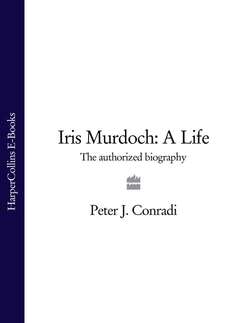Читать книгу Iris Murdoch: A Life: The Authorized Biography - Peter Conradi J. - Страница 16
8
ОглавлениеA marriage brings two worlds, as well as two people, into collision. Hughes’s cousin Don Douglas, grandson of Elias and so a ‘solid’ Murdoch by birth, regarded the Richardsons as rackety, and recalled Hughes’s marriage as a serious social blunder.51 If Rene had, by the hypocritical standards of the day, ‘got herself into trouble’, such odium would be explained. Her sister Gertie must also have been pregnant when she married, on 22 February 1919: Gertie gave birth at 59 Blessington Street to her eldest child Victor four months later, only three weeks before Iris was born at the identical address, probably in the same room. Gertie’s Scottish husband Thomas Bell, like Hughes, was a Second Lieutenant in King Edward’s Horse. There must have been a double courtship. It is striking that there is no Murdoch witness to Iris’s parents’ marriage certificate, especially as Hughes’s uncle lived close by in Kingstown, and his mother and sisters in Belfast.* Rene’s father is moreover shown, erroneously, as a solicitor (deceased). The Law Society in Dublin has no record of a solicitor called Effingham Richardson. In fact he worked in a solicitor’s office, ‘law assistant’ probably signifying a clerk. Perhaps Rene and Gertie enhanced his status to compensate for any loss of caste on Hughes’s part, or perhaps their mother had misremembered and misinformed them.
Iris’s birth at 59 Blessington Street was probably difficult, perhaps, John Bayley believed, with the umbilical cord wrapped around the baby’s neck. Rene had also had a rough time from Hughes’s sisters and mother. She ‘didn’t fit in with the Protestant ethic’, thought Iris’s first cousin Cleaver Chapman.52 As an Elder in the Apsley Hall Brethren assembly, his words come with some authority. Rene was beautifully made-up, cheerful and bright; she loved the coffee-shop, Cardews, in Kildare Street, where she went as a ‘flapper’. Her new sister-in-law, ‘wonderful’53 Aunt Ella, was bossy and critical and on occasion ungenerous, smiling but lacking charity. Rene handled the disapproval very well, with tact, patience and good grace.
Rene liked to joke about North and South Dublin, and to be ironical at her own expense, socially speaking. When Iris’s husband John Bayley in later life complimented her gallantly by saying that he was sure Rene must have been ‘the toast of Dublin’ when she was a girl, she would jokingly reply, ‘Only of North Dublin.’54 While Dublin north of the River Liffey was seedy and poor, the rich, smart suburbs stretched out to the south, from Rathmines to Dalkey. None the less, Rene had started to make her mark as a singer, and as a charming and modest personality. Like her mother-in-law, she had a happy temperament. There was a great deal of amateur opera about in Dublin, ‘that great singing city’, as Joyce’s own life, and his story ‘The Dead’, display. After her marriage Rene gave up professional performance, although choir-singing continued, and her beautiful voice was most often heard privately. She never said she minded abandoning her training, had ‘no great agony about it’, and appeared indifferent to fame and ambition. She knew she was talented, but did not take her gift too seriously. Iris, on the other hand, minded for her, and grieved for her mother’s loss of career.55 In her fiction she depicted wife after wife who has abandoned career for her husband.56
